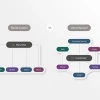Omnichannel marketing is a strategy that aligns content delivery across marketing channels — online, offline and everything in between — to provide a seamless, consistent experience. Here’s what marketers need to know to get it right in 2025.
Omnichannel marketing remains one of the most effective tactics for driving engagement, loyalty and conversions. And as customer expectations rise, it’s more important than ever for brands, publishers and organizations to deliver consistently across every touchpoint.
What is omnichannel marketing?
In short, omnichannel marketing synchronizes content delivery and customer experience across channels — desktop, mobile, app, store, social media, email and beyond. The goal is to support a seamless journey from discovery to conversion to post-purchase support.
Gartner defines omnichannel as aligning content, messaging and interactions across channels to support customers wherever they are. That now includes not just digital and in-person touchpoints but also voice assistants, wearables, smart TVs and even in-car systems.
Why does this matter? Because today’s customers don’t think in channels. They move fluidly between them. One interaction may start with a push notification, continue in a browser and end with a pickup in store. The experience needs to feel intuitive and connected at every point.
Multichannel vs. omnichannel: what’s the difference?
Multichannel marketing means being present on more than one channel. Omnichannel takes it further — it means connecting those channels in a way that feels unified. It’s not just about being everywhere, it’s about being cohesive everywhere.
The difference is critical in 2025 when fragmented experiences can quickly lead to churn. Consumers expect brands to know who they are, anticipate their needs and meet them in real time.
What role does content play?
Content is the fuel for the omnichannel engine. Every asset — blog post, product description, push alert, support article — must be part of a broader strategy that supports the entire customer lifecycle.
An effective omnichannel content strategy ensures that:
- Content is accessible and optimized for every relevant channel
- Messaging stays consistent while adapting to the context of each platform
- Teams can quickly repurpose and personalize content for different audiences
For example, a customer may research a product via your mobile site, engage with support via chatbot, receive a follow-up email with a discount and complete their purchase through a smart speaker. Each of these content moments needs to be connected and cohesive.
The 2025 state of omnichannel
Since 2021, the number of companies investing in omnichannel strategies has surged. According to PwC, more than 80% of companies now prioritize delivering an integrated customer experience, up from just 20% a decade ago.
The challenge in 2025 isn’t whether to adopt omnichannel — it’s how to do it well. McKinsey reports that brands that lead in customer experience grow revenues 2x faster than those that lag behind. What sets leaders apart is their ability to unify customer data, content and delivery across systems and teams.
Why CMS matters to omnichannel success
Technology plays a foundational role in omnichannel execution — and that starts with the right content management system.
Brightspot’s CMS is built for omnichannel success, offering features that support unified content creation, delivery and optimization. Here’s how Brightspot helps:
- Centralized content hub: Create and manage all content from one intuitive platform
- Flexible distribution: Push content across any channel, device or experience using headless or decoupled CMS models
- Modular content capabilities: Atomize and repurpose content elements for different formats and platforms
- Integration-ready: Connect to your broader martech stack — including CRMs, analytics, personalization engines and more
- Personalization features: Use data from any channel to drive relevant real-time content delivery
- Speed to market: Launch omnichannel experiences in as little as 90 days
In a fragmented landscape, Brightspot makes it easier to orchestrate omnichannel content that performs — and evolves with your customer’s journey.
Getting omnichannel right
The gap between omnichannel leaders and laggards is wider than ever. According to Forrester, brands that fail to unify their content and customer experience strategy risk falling behind as customer expectations for relevance and convenience increase.
Only 18% of marketing leaders say they’ve achieved true cross-channel personalization in 2025. That’s an opportunity for brands to differentiate by delivering content and experiences that feel smart, seamless and customer-first.
The key? Pairing the right strategy with the right technology.
Final thought
Omnichannel isn’t a trend — it’s table stakes. And while many brands are still playing catch-up, the ones investing in unified content strategies and CMS tools are creating experiences that drive loyalty, retention and revenue.
Brightspot enables this future, serving as the foundation for brands to deliver seamless personalized experiences — wherever the customer journey leads next.







